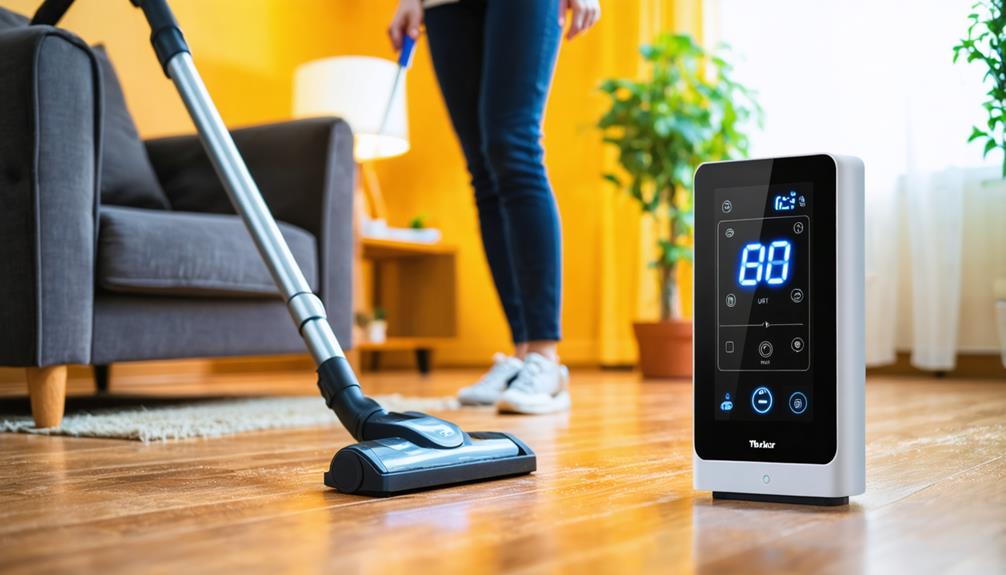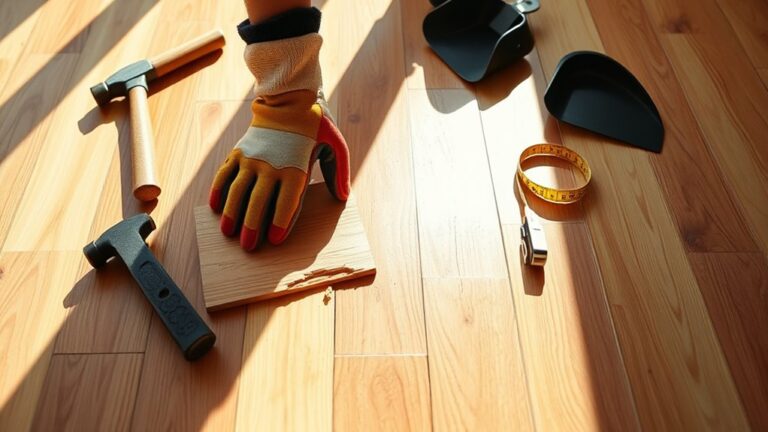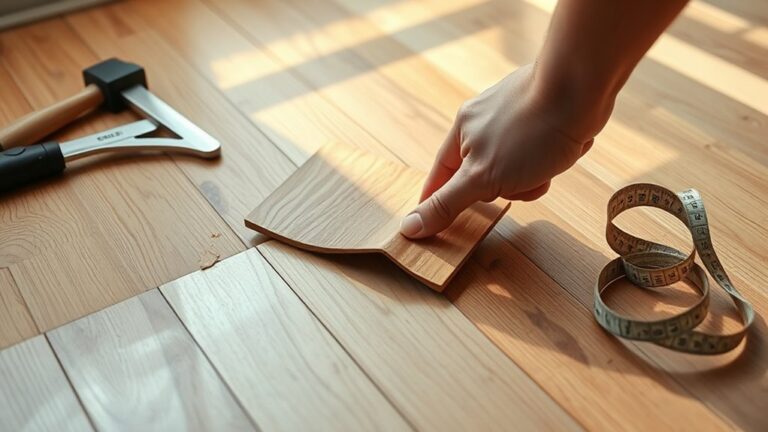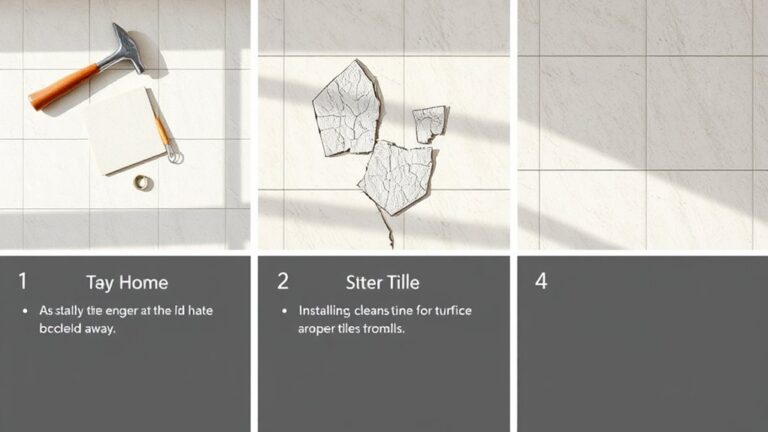To care for your heated floors and extend their lifespan, start with regular inspections for visible damage and leaks. Schedule annual professional maintenance to keep your hydronic system efficient by flushing sediment and checking components. Adjust your thermostat seasonally, aiming for floor temperatures between 75°F and 85°F. Gradually increase temperature settings in the fall to avoid thermal shock, and drain hydronic systems if they're off for long periods. Finally, keep an eye on any unusual noises or heating inconsistencies, as these might signal underlying issues. If you want more tips on maintaining ideal performance, there's plenty more to take into account.
Overview of Heated Floor Systems
Heated floor systems offer an efficient way to keep your space warm and comfortable. You'll find two main types: hydronic heating systems and electric radiant heat. Hydronic systems circulate hot water through tubing beneath your floors, while electric radiant heat utilizes heating cables or mats to generate warmth. Both systems excel at providing even heat distribution, which enhances comfort and improves indoor air quality by minimizing dust circulation.
When considering a radiant heating system, it's vital to recognize the installation costs. For a typical 2,000 sq ft home, hydronic system installation can range from $14,000 to $48,000, making it a significant investment. Electric systems are generally more cost-effective, especially for smaller areas, and they tend to be easier to install.
These systems can be zoned, allowing you to customize temperature control in different areas of your home or commercial space. This feature not only boosts comfort but also enhances energy efficiency, as you can heat only the spaces you use.
To maximize the benefits of your heated floor system, proper care and regular maintenance are essential. While we won't explore maintenance specifics here, it's significant to understand that routine inspections and servicing can help extend the lifespan of your system. By investing in a heated floor system and caring for it properly, you'll enjoy a warm, comfortable, and energy-efficient environment.
Importance of Regular Maintenance
Maintaining your heated floor system is essential for guaranteeing its efficiency and longevity. Regular maintenance not only keeps your system running smoothly but can also greatly reduce energy costs—by 10-30% compared to traditional heating methods. By staying on top of maintenance, you can enjoy a comfortable home without breaking the bank.
Here are four key areas to focus on during your maintenance routine:
- Annual Professional Inspections: Schedule yearly check-ups with a qualified technician to assess the overall condition of your system. This helps identify potential issues before they become costly problems.
- Visible Damage Checks: Regularly inspect your floors for any visible damage or leaks. Early detection is critical for preventing major repairs and guaranteeing even heat distribution.
- Flushing Hydronic Systems: It's essential to flush your hydronic systems annually to remove sediment buildup, which can hinder efficient operation and shorten the lifespan of your components, potentially lasting between 20-75 years with proper care.
- Thermostat Monitoring: Calibrate your thermostats routinely to guarantee accurate temperature readings. This not only contributes to a consistent heating environment but also helps prevent energy waste.
Best Practices for Care
Caring for your heated floor system involves a few straightforward practices that can make a big difference in performance and longevity. First, make it a habit to regularly inspect your system for visible damage or leaks. Verify components like pumps and valves are functioning properly to maintain efficiency and prevent costly repairs.
Cleaning your flooring surfaces using appropriate methods is vital. For hardwood floors, a simple mixture of water and vinegar works wonders, while engineered floors require specific cleaners to avoid damage.
Don't forget to schedule annual professional maintenance for hydronic systems. A sediment flush can help clear out any buildup, and checking the condition of mechanical components can greatly extend the system's lifespan.
Adjusting your thermostat settings according to seasonal changes is essential. Keep floor surface temperatures between 75°F and 85°F to optimize energy efficiency and guarantee your comfort. Remember, the right settings not only keep your floors cozy but also help reduce energy bills.
Seasonal Maintenance Tips
Regular upkeep isn't just about best practices; it also involves being proactive with seasonal maintenance. To guarantee your heated floors perform at peak efficiency, here are some essential seasonal maintenance tips you should follow:
- Gradually Increase Temperature Settings: As fall approaches, slowly raise the temperature settings. This helps prevent thermal shock and guarantees your system's operational before winter, avoiding potential damage or leaks.
- Conduct a Thorough System Check: After heavy usage in spring, perform a detailed system check. If you'll be shutting down your hydronic systems for an extended period, drain them properly to prevent freezing.
- Monitor and Clean Filters and Vents: Regularly assess system performance by checking and cleaning filters and vents. This is vital before the heating season starts and after long periods of use to maintain peak efficiency and airflow.
- Schedule Annual Professional Inspections: Don't overlook the importance of annual professional inspections. These checks help catch potential issues early, guaranteeing all components, including pumps and boilers, function correctly before the heating season kicks in.
Troubleshooting Common Problems
When you encounter issues with your heated floors, it's crucial to address them promptly to guarantee comfort and efficiency. One common problem is uneven heating or cold spots, which may indicate trapped air in a hydronic system. To resolve this, you can bleed the system to release those air pockets. If you're dealing with electric systems, check for malfunctioning thermostats if you notice temperature inconsistencies; they can disrupt the heating cycle and lead to inefficient operation.
Another important issue is water leaks, often stemming from corroded pipes or loose connections in a hydronic system. Regularly inspecting these areas is essential to identify and fix leaks before they escalate. If you hear unusual noises like banging or gurgling, this could signal air in the system or issues with the pump. Addressing these sounds requires immediate attention to prevent further damage.
Frequently Asked Questions
What Is the Life Expectancy of a Heated Floor?
Imagine walking on a warm, inviting floor on a chilly day! Heated floors can last 25 to 75 years, depending on the system type. Hydronic systems generally outlast electric ones, benefiting from energy efficiency and effective moisture management. However, regular maintenance is key. Keep an eye out for troubleshooting issues, like uneven heating or increased energy bills. Choosing quality flooring materials and considering safety precautions during installation can enhance longevity and performance.
How to Maintain Heated Floors?
To maintain heated floors, prioritize regular floor cleaning using suitable methods for your flooring materials. Monitor temperature control and adjust settings seasonally for energy efficiency. Remember the importance of insulation to prevent heat loss and keep humidity levels balanced. Schedule maintenance frequency to troubleshoot any system issues promptly. Finally, follow safety precautions during installation to guarantee peak performance and longevity of your heated flooring system, allowing you to enjoy its benefits without worry.
How Long Does Heated Flooring Last?
Imagine your heated floors as the trusty steed of your home—lasting years with the right care! Typically, electric systems can last 30-40 years, while hydronic might stretch to 50. Installation tips, energy efficiency, and flooring materials all play a role in longevity. Cost considerations and temperature control are crucial too. Regular maintenance guarantees safety measures are upheld, while user experiences can guide repair options. Don't overlook environmental impact and design integration for a lasting solution!
What Is the Lifespan of Underfloor Heating?
Underfloor heating can last between 20 to 75 years, depending on installation quality and maintenance. To guarantee longevity, follow installation tips and consider energy efficiency when selecting flooring materials. Regularly troubleshoot issues and manage moisture to avoid damage. Also, implement temperature control for peak performance. Keep safety precautions in mind and plan for potential system upgrades, as mechanical components may need replacement sooner. Overall, investing in maintenance can greatly extend its lifespan.




